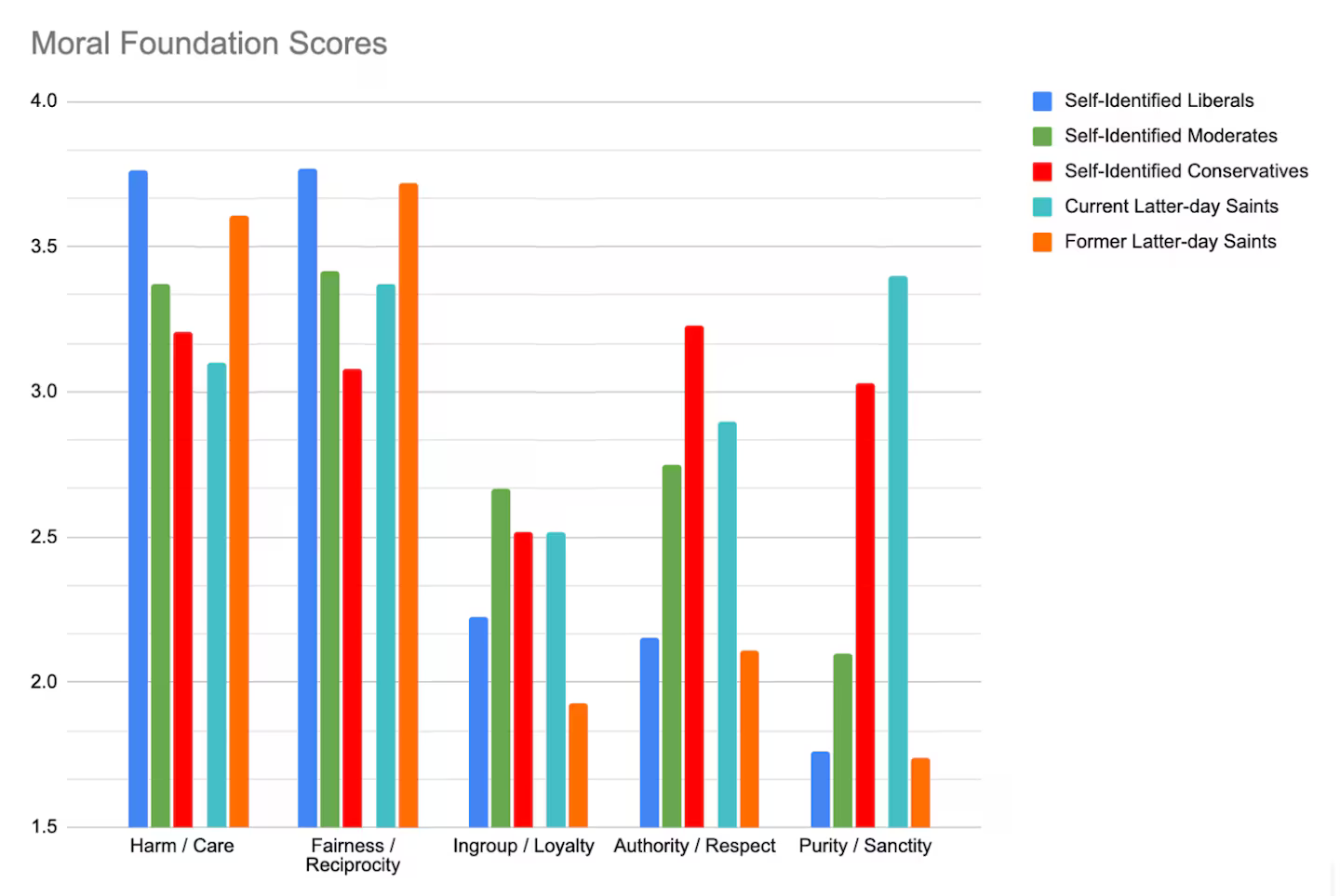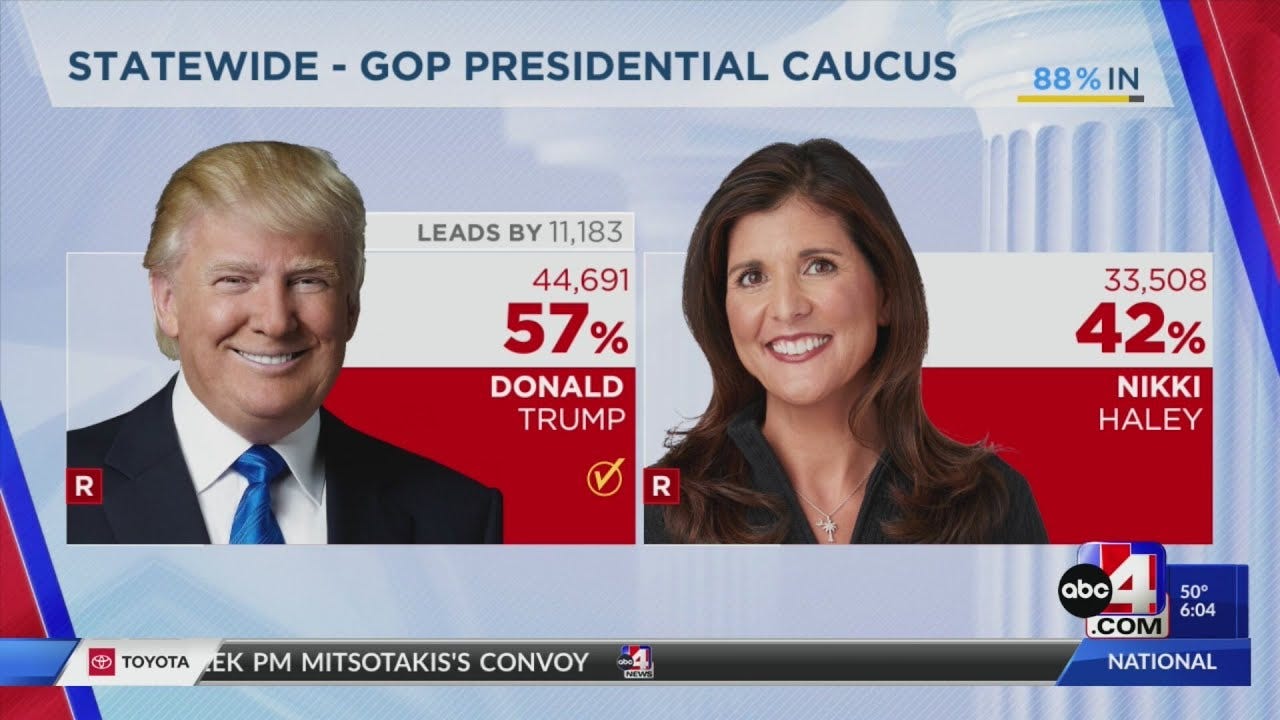Why have Latter-day Saints historically been less likely to support Trump?
Compared with the surprisingly robust support from other Christians, Latter-day Saints have generally been hesitant to support the former president from the beginning. Many continue to feel so now.
Evangelicals in Iowa came through for former President Trump in January, and have continued to do so in South Carolina and other states in subsequent months. Some have wondered whether the people of Utah would do the same.
They did…mostly. A plurality of Republican voters in the state supported the former President. But consistent with historical trends, they did so in hesitant fashion - far more than other conservative states.
Although I have had serious reservations about Donald Trump’s campaigns for America’s highest office, I am on record defending my many thoughtful friends and neighbors who have voted for him (often with many of their own serious reservations).
So many disparaging accusations against these voters have been mean-spirited and failed to reflect deep understanding of the reasons many have for supporting him the first time, and now the second (Brett Stephens’ “The case for Trump by someone who wants him to lose” is one of the best summaries of those reasons in this 2024 contest).
Just as we should do our best to understand the sincere motives of those who support the former President, it’s worthwhile to appreciate the concerns of those conservatives who don’t, including a disproportionate number of Latter-day Saints.
A whirlwind history. In 2016, 4% more Catholics and Evangelicals voted for Trump compared with prior Republican Presidential candidates. By contrast, Pew Research found that Latter-day Saints supported him 18% less in 2016 compared with prior Republican candidates. At the time, 2016 exit polling also confirmed significant reservations among those Utahns who did support him.
Earlier that fall, then candidate Trump acknowledged to a group of evangelical pastors that he had a “tremendous problem in Utah," telling them, "Utah is a different place."
Although many Utahns eventually consolidated around the Republican nominee, David Campbell, a political scientist at Notre Dame University remarked in late 2016, “His personal background and locker room language are off-putting" to Latter-day Saints - going on to note that the frequent "anti-immigrant rhetoric" was grating for "a population that has been subject to religious discrimination, including federal policies to limit the immigration of [Latter-day Saints] back in the 1800s.”
This also helps explain why Utah has bucked the national trend among conservative states in relation to refugees and migrants, with two consecutive Republican governors welcoming Syrian and Afghan refugees, while making proactive efforts to encourage the enactment of fair compromises on immigration (see Utah Compact). Leaders of the Church of Jesus Christ of Latter-day Saints have also made regular statements on immigration and spoken in their semiannual General Conference about compassion toward refugees.
That first year, many Latter-day Saints eventually “voted for the issues,” with Don Peay, the Trump campaign's state director in Utah at the time, pointing out that “Trump lines up on the issues 95 percent of the time [with] basic Utah and [Latter-day Saint] beliefs — limited government, local control, strong national defense and individual responsibility.”
After President Trump’s 2016 victory, many Latter-day politicians took a similarly pragmatic approach. For instance, Mitt Romney said in 2018. “I’m with the president’s domestic policy agenda: low taxes and low regulation, and smaller government, pushing back against the bureaucrats… on policies, we’re pretty much in the same place.”
After a 2018 poll showed a plurality of Latter-day Saints continuing to support the president, Brigham Young University political scientist Quin Monson argued that it’s likely most of them are in the “somewhat approve” category: “Even if they’re loyal Republicans, they’re still unhappy loyal Republicans."
“This is not the same sort of gung-ho enthusiasm you might get for a Republican president," he said at the time. "It’s lukewarm. It’s tepid. It’s begrudging.”
An earlier 2017 survey also found that those who classify themselves as Never Trump were more likely than other Republican subgroups to identify as Latter-day Saint.
Some of the most prominent and vocal critics of the President over his tenure were also Latter-day Saint politicians – including 2016 Presidential candidate Evan McMullin, Senator Jeff Flake of Arizona and Senator Mitt Romney of Utah.
In 2017, Senator Jeff Flake published a book where he detailed his concerns with the direction of Republican leadership. The following year, Flake announced he would not seek re-election, delivering a speech on the Senate floor described by Atlantic columnist McKay Coppins as a "thundering indictment of his party, his president, and his country's political culture" and called "the most important speech of 2017" by CNN commentator Chris Cillizza.
After being censured by the Arizona Republican Party for his lack of loyalty to party leadership, Flake responded, "If condoning the President’s behavior is required to stay in the Party’s good graces, I’m just fine being on the outs."
Senator Mitt Romney's opposition to the president, of course, is well known - with his choice to join Democrats in an impeachment vote essentially sealing his transition from being the Republican Party's standard-bearer in 2012 to becoming a reviled outcast among many supporting the new president (with “RINO” being one of the softest name-callings directed his way).
In a summer 2023 article entitled, “The GOP has a glaring Mormon problem” Washington Post columnist David Byler summarized this prior history:
Trump turned off many LDS voters with his uncouth personal style, constant feuds with Mormon Sen. Mitt Romney of Utah and attempts to restrict Muslim immigration. (Mormons faced religious discrimination throughout U.S. history and tend to react negatively to attacks on any single religious group.)
This history from 2016-2020 is more well-known. But what has happened since 2020? My friend Patrick Mason asked me, “are Utah Republicans as likely as other Republicans nationwide to go along with Trumpist claims about the 2020 election, what happened in January 6, the various legal claims against Trump, and so forth?”
“Does Trump still have a ‘tremendous problem in Utah,’” Patrick asked, “or have most Latter-day Saint Republicans come around?”
I’ve been curious to find that out myself.
Latter-day Saints are okay disagreeing about politics. It’s important to point out here that even though members of the Church have in recent decades embraced a Republican party platform more in line with many gospel teachings (on the family, abortion, fiscal responsibility), the leadership has long encouraged Latter-day Saints that “principles compatible with the gospel may be found in various political parties, and members should seek candidates who best embody those principles.”
I’ve heard this kind of a letter many, many times - and always encourage an atmosphere of engagement and civility among our people.
My grandfather was a life-long Democrat after witnessing how Democratic politicians worked to help the poor during the Great Depression. He ran for county attorney as a Democrat, and believed in the importance of having two parties in Utah offering different perspectives. After seeing so many cancer patients struggle to access care during her long bout with cancer, my mother also became a Democrat - which made for some interesting conversations with Dad.
Many other families and marriages are having similar red-blue conversations - hopefully, with generosity, kindness and respect. In April of 2023, data guru Ryan Burge summarized all the statistics confirming that many young Latter-day Saints are abandoning the GOP, for a variety of reasons.
Recent Utah polling on former President Trump. In summer of 2023, the Latter-day Saint governor of Utah, Spencer Cox cited polling at the time showing that 60 percent of Republicans “aren't crazy about their front-runner, and 70 percent of Democrats actually aren't crazy about their front-runner.”
“We're kind of sleepwalking into this election that nobody is excited about and that nobody wants,” the Governor told CNN’s Dana Bash. “And, sadly, we're heading into what I believe and I think most Americans believe will be the next most divisive election of our lifetimes.”
While polling operations outside of the state have occasionally claimed support for the President increasing from 38% to as high as 48% support among Utah Republicans over the last year, the local polling by Dan Jones & Associates (co-sponsored by Deseret News, University of Utah Hinckley Institute of Politics) found in 8 consecutive polls last year a much slower and more vacillating increase in support and with a lower ceiling:
Utah Republican Support for former President Trump in the 2024 Primary
Dan Jones & Associates, Deseret News, University of Utah Hinckley Institute of Politics
Notice how slowly numbers grew, only pushing above 30% in late fall - significantly lower than other conservative states. In late 2023, Trump maintained a double-digit lead over his closest challenger, yet Utah continued to be the most competitive red state with available polling from six months, according to aggregate data from FiveThirtyEight. This again contrasted with Evangelical support, which remained more robust and enthusiastic.
Why such varying levels of commitment and emotional support between different groups seeking to follow Christ?
While many people have raised various possibilities, I’m intrigued by the theological differences among Latter-day Saints and other Christians when it comes to the centrality of repentance and moral purity itself. As my friends Stephen Cranney and Josh Coates recently found, self-identified Latter-day Saints score measurably higher on measures of how much they value “purity/sanctity” when compared with any other group, including conservatives generally.
[This graph visualizes the Moral Foundation values of self-identified political identities compared with those of current and former Latter-day Saints. Data has been aggregated and normalized from Graham 2012 and CFLDS 2023 survey data. | Source: B.H. Roberts Foundation 2023 Current and Former Latter-day Saint Survey, of 2,625 self-identifying church members].
If this difference is meaningful, could it partly explain why Utahns (and the Latter-day Saints who make up so much of the state’s population) are more hesitant to support the former President than other conservatives in the country?
What the Utah primaries showed. Some had hoped Utah could lead the way in rejecting Trump’s new candidacy. But that was not to be. Earlier this month, Utah Republicans joined those states supporting former President Trump’s nomination. But they did so by a significantly smaller margin elsewhere.
The New York Times report on Super Tuesday described how Ms. Haley was “crushed” in many places. “The only exception was in and around Salt Lake City,” the article notes, “where Mr. Trump still faces considerable opposition from Mormons in his own party.”
Preliminary numbers showed Utah with the former President’s smallest lead, with the exception of Vermont:
The final Utah vote count released last week showed a slightly smaller lead of 13%, with former President Donald Trump securing 56.4% of all votes counted, while former South Carolina Gov. Nikki Haley received 42.7%
As my colleague Brigham Tomco reported, “Trump’s winning margin in Utah of 12,000 votes was less than that of any other red state, excluding Vermont.
Although Trump won all but one of Utah’s 29 counties, Tomco reported that “Haley came in neck and neck with the former president in some of the state’s most populous areas, beating him in Davis County by 300 votes, and losing in Salt Lake County and Utah County by less than 1,000 votes.”
This is small consolation for those who hoped to see more resistance to an attempt at a second term by the former president. Clearly a plurality of Utah Republican voters are supporting Trump’s desire for a second term of office.
That’s the main take-away here. But there’s a subtext not worth repeating: Former President Trump may not have to worry about Utah ultimately supporting him in November - even if many voters still have to hold their nose to support him.
He may have Utah’s votes, but he doesn’t have their hearts.









